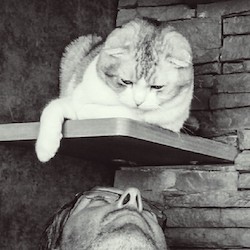|
For a long time, we liked to kid ourselves that Tasmania is a ‘natural laboratory’ that’s home to a world-class research community. This is not and never was true. But it could be. Sure, we have some top-notch researchers doing amazing stuff here. You don’t have to dig very deep to find them. Add to that our indisputable advantages in certain niche areas such as marine science, biotechnology, forestry, and health, and the potential is impressive indeed. Our state is geographically and ecologically diverse, clean and green, effectively self contained, and it offers a lifestyle appealing to many people. But we need to stop saying things like we’re an ideal base, and that we’re a hub of research activity, and instead prove it. This is eminently achievable in Tasmania, much more so than it would be in any other Australian region. The outcome would be unique and serve as an extremely solid marketing and promotional tool for our state. Our state could become a small-world network. What if Tasmania became known for its comprehensive network of researchers? With government and industry partners, accessible technical facilities and services, operational support, and a streamlined information exchange system? In other words, what if Tasmania became a single body of research effort, where anyone who worked here had everything they needed right at their fingertips?
Before I go on, the following contains vast generalisations. The generalisations are, however, based on a great deal of investigation and experience, and can be backed up with records of interviews and real-life examples. (This idea is based on a more substantial report commissioned by the Tasmanian Government over a decade ago, which I co-wrote, available on request. To my knowledge there hasn’t been any comparable follow-up since then.) I’ve noticed a recurring problem. I have been working with science researchers and private businesses with an R&D component on and off since 2003. I have also worked closely with the Tasmanian Government, one of whose aims is to encourage collaboration between researchers and industry. Over the years the government has tried a host of programs intended to manage such relationships and attract research investment to the state. But the Department of State Growth currently has a single web page dedicated to science research in Tasmania. The ‘sector summary’ was written in 2014. Very few researchers know what their neighbouring researchers are doing. Many are not aware of how their work might benefit other researchers or industries. And, not surprisingly, many industry people do not know how to find help with their R&D, or are put off by the red tape associated with entering into a formal relationship with a research institute. Opportunities are being missed. Notworking events Scientists typically are the first to admit that they do not enjoy, and are not good at, networking in the conventional sense (I told you there’d be generalisations). Events intended to build networks and introduce people with complementary interests rarely result in useful contacts being made. While event organisers provide drinks and snacks and invite people to mingle, many attendees leave the event having spoken only to those they already know. So, let’s build a database! Databases aren’t terribly effective either. To be kept up to date they require regular maintenance by administrators, ICT specialists and the researchers themselves. They provide only a snapshot of activity, with information presented inconsistently and in language that often is impenetrable to anyone not from that field. My discussions have revealed that few researchers or private organisations use databases to prospect for opportunities. In an ideal world, researchers would be aware of others’ work that could complement their own. They would easily be able to find resources and equipment. Industry people would be able to find specialist help, and researchers would be able to find practical and commercial applications for their expertise. A network would form of its own accord, without those involved needing to spend time actively making contacts. Partnerships would form naturally. The story of the travelling salesman Most successful organisations these days exploit an ‘account management’ model. An account manager travels from client to client, gauging the business’s needs in order to sell her own company’s product, whether that’s pharmaceutical goods or advertising space in a magazine. She visits regularly, and keeps on top of changes in each of her clients’ requirements. Although she closely guards sensitive information, often she is able to help a particular client based on what she knows about the industry as a whole. Unlike someone who works for an individual business, an account manager sees the whole industry. In little-old Tasmania you’ll often find that a single account manager can cover an entire industry sector. Thanks to the account manager’s discreet involvement a great many solutions to technical problems are found, and a great many connections are made. Tasmania’s research sector needs effective account management. Unlike account management with a commercial focus, this model would have the interests of the entire sector at heart, serving to facilitate new connections, maintain a knowledge base, and manage formal relationships where necessary. Let's call it ‘Smallworld’. In Smallworld, the account manager’s job is to meet people. He or she speaks with senior managers and academics to get a feel for their interests and capabilities, and compiles a list of individuals who are working at the coal face of that particular field. One by one, the AM interviews researchers and collects information about what each is doing, what services they might offer to others, what services or help they are searching for, what specialist equipment they use. The AM writes up the information in a standard, consistent format (in language that is technical if necessary but general enough to be understood by those not from that field), then with the researcher's permission loads the information into a secure ‘knowledge vault’, or electronic repository. The account manager needs a general understanding of science, and an excellent understanding of people. While the knowledge vault would be a valuable resource, it is the account manager who is the key to cementing the Smallworld network. There's no substitute for face to face. Researchers and business people become used to the regular visits. Over conversations, new projects are brought to the surface, obsolete ones are quashed, introductions are made, and opportunities are born. A good account manager is a very useful person in this respect. And the best thing about this approach is that the researcher does not have to lift a finger, apart from giving up half an hour for a one-on-one chat from time to time. Once Smallworld has been set up, the account manager needs only to keep the plates spinning. The benefits of Smallworld In addition to the direct benefits that Smallworld would give to researchers and industry there are a number of spin-off advantages:
Who would look after Smallworld? Smallworld could be run by a (very) small group of administrators, account managers and a geek or two to build the knowledge vault and internet portal. Most of the resources we already have; it would merely take a little shuffling and redirecting to begin building Smallworld. Smallworld doesn't have to be ‘finished’ for it to be effective. Like any good network, it would essentially build itself. According to small-world network theory, places like Tasmania are ideally suited to embrace a close-knit model of doing business. Our network of researchers is sufficiently closely connected to be self sustaining. Check out Aussie Duncan Watts’ excellent work on small-world networking: Small Worlds – The Dynamics of Networks between Order and Randomness. One last thing about Smallworld: it doesn’t need to be limited to science research. The same model could be applied to any of Tasmania’s industries: tourism, farming, manufacture, health care, minerals ... Islands rock. Comments are closed.
|
Serious stories about communication
told in a silly voice. Categories
All
Bruce Ransley
I dig a little deeper than most comms folk. From science at university, to a cold-and-wet career as a commercial diver, to working underground, and for the past 17 years as a communicator-at-large, I've had my fair share of weird experiences in all sorts of situations. It's given me a fair-to-middling grounding in all things explanatory. |


 RSS Feed
RSS Feed
